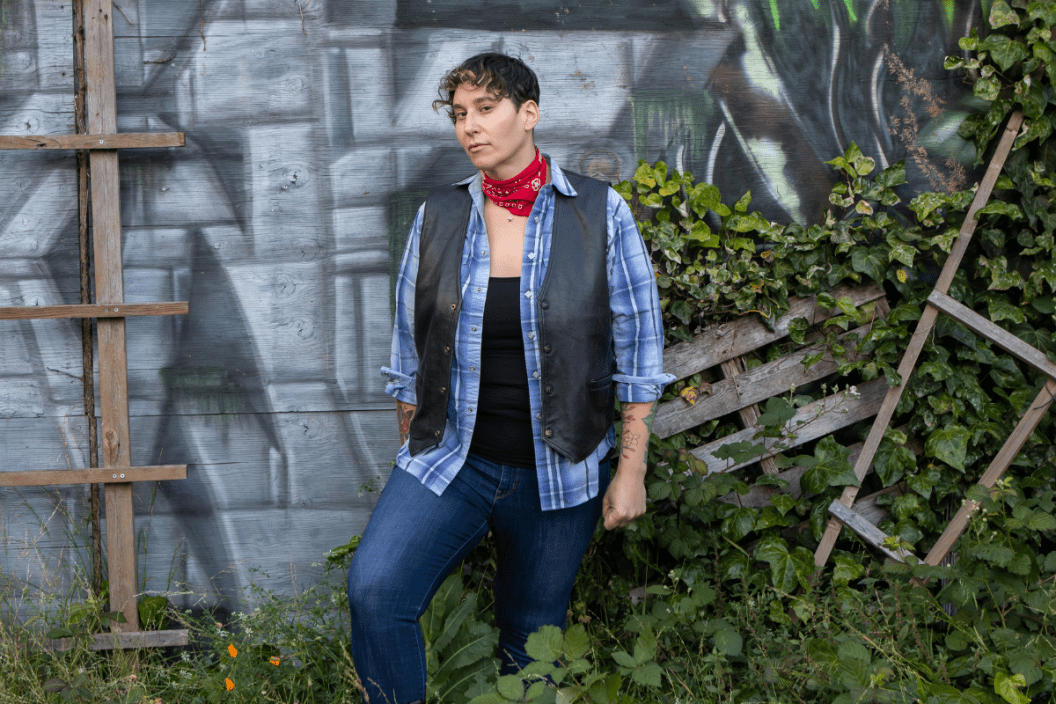Mya Byrne was on a flight from Nashville to LA when it hit her. She'd been bouncing around titles for her new record, her first since 2014's As I Am, for a while but nothing stuck. In a half-asleep state, the words Rhinestone Tomboy struck her like a bolt of lightning. Those two little words encompassed everything she was and is: a rhinestone-studded purveyor of honest-to-goodness songwriting with a venomous bite. Lying somewhere along the "great continuum," as she put it, of gender and identity, Byrne is nothing if not a straight shooter — so to speak.
Written during lockdown and the early days of her sobriety, the 12-song album demonstrates a considerable shift in her songwriting. "I take my songwriting very seriously, and during lockdown, with all of the tragedy, songwriting was my real outlet. And it was the way that I connected with my friends," she says. "Of course, we're all writing about the state of the world. But there was a shift in my writing where even if I was writing about myself, I was transcending these parts of myself. I didn't realize how deep it had been and how that affected people until I started playing the songs live."
An "observer of life," Byrne sent producer Aaron Lee Tasjan 65 to 70 songs from which to choose, and he whittled down to 11. The 12th and closing track "That's What Lucky Means" come from a challenge Tasjan proposed to Byrne: to write a song during the studio process. Songs selected, Byrne began pumping out three demos a week, first in San Francisco and then later from her friend's Upper West Side apartment. "Aaron wanted me to absorb the songs," she says. "It's not something I think I would have done if it'd been to a few years back."
Most of all, Byrne learned how to "put down [my] ego and let [myself] loose," she adds. "Most of the time that I've been making art, professionally, I've been the one in charge."
In every conceivable way, Rhinestone Tomboy demanded a different creative process, one untethered from one's own narrow vantage point. Instead, Tasjan guided her hand in and out of the studio. Byrne also learned to "let Aaron's dream of what I could sound like breath," she says. "And it brought me to a higher place of knowing what I could do with my own music. And it's very powerful. There were multiple times during the recording process when all of us were in tears. It was such a moving record to make."
Lyrically, Byrne has never been more honest. Take "Sweetheart of Mine," for example. In the song, co-written with Karen Dahlstrom, she regales a tale about falling in love with a man. "I've always identified myself as queer, but I didn't really come to terms with the fact that I was falling in love with a man," she says. "It's funny. I often say coming out is a lifelong process. I'm a lesbian, but I don't discriminate. It's not a love song but an am-I-in-love song."
Then, there's "Devil in My Ear," among the darker tracks on the album. "If I wanna see God I gotta learn to kill," she coos over snarling drums. "It's all just a part of my free will."
On the song, she shares its origins, "I was in the middle of my early step work in Alcoholics Anonymous and talking about turning your will and your life over to a higher power." From there, she decided to "just sort of go down this path" of exploring where evil comes from, asking herself questions like "Are people inherently evil or does evil find people?"
"I'm not going to proselytize recovery programs or anything like that," she continues. "But it's this concept of if we stop trying to control everything, the good things are going to happen. Then, the people who do try to control everything, where would this path go? It's one of the deepest murder ballads. I have to destroy everything to get my way. And that's my choice to destroy — and it scares me sometimes to sing it."
Byrne then turns her attention to the devastating fires in Paradise, Calif. that took place in 2018 with the spooky death rattle "Smoke & Bones." She recalls how the song landed in her lap. "The sky was orange, and you couldn't tell day from night," she remembers, noting her and her friends weren't allowed to leave their place. "You couldn't keep the dust and the dirt out, and everything smelled like death."
She recalls sitting at the piano and hammering out the lyrics, which examine how native peoples and their land have been destroyed not only by fire but the government. "It's not just about the land," she says. "It's about how people are treated in California. People think of California as the best liberal place in the country. And it's not. It's like Texas. There's a lot of greed, and there are these corporations that own everything."
"Twenty thousand people huddling in tents / Night falls in a Walmart parking lot," she sings into a cloud of swirling musical smoke. "Twenty thousand people without a home to go / Giving thanks for anything they still got."
It's a haunting, tortured performance that sees Byrne "speaking as an elder and as a future ancestor," she says. "I don't want people to have to go through the kind of awful tragedies that California has seen over the last five or six years. To an extent, it's changing. A friend works with native folks in Oregon on traditional fire management, and they've actually been brought in by folks in California now to teach the old ways back to these folks who've been forbidden from burning them. I'm hoping that we will get to a point where this all changes, but the fires affect everybody. No matter how many freaking air filters you have — I own five air filters. I had to move because I couldn't breathe anymore. The air quality here [in NYC] is actually a lot better."
Byrne cobbles Rhinestone Tomboy together with probing glimpses into the human condition and what it means to exist in an increasingly volatile world. Each layer she uncovers offers deep insight into not only who she is as a person, but how we all move in the world and relate to one another. Rhinestone Tomboy emerges as Byrne's personal manifesto, a record so steeped in character and detail that the listener can experience her world in real-time. It's evident that in letting go she's arrived upon something that transcends the here and now, yet also serves as a time capsule to this moment in time. The album, which boasts such talented players as Tommy Scifres, Megan Coleman, Scott Stein and Ellen Angelic, in addition to Tasjan, finds Byrne blossoming into a vibrant artist, one with a singular voice that needs to be heard.
Rhinestone Tomboy is out now via Kill Rock Stars Nashville.




